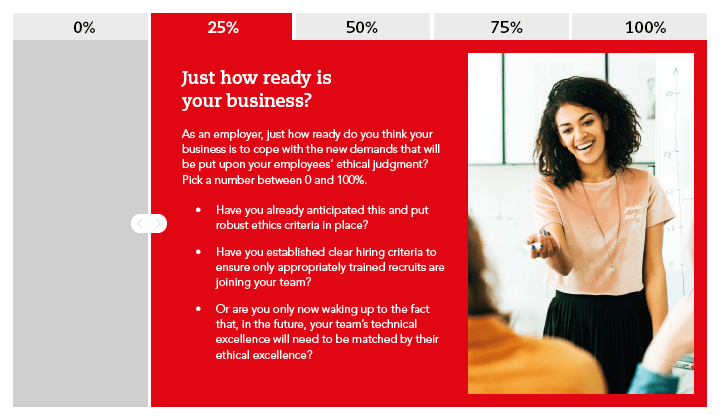Ethical standards are set to become a significant differentiator between firms of equal technical capability
The digital age is now regularly presenting professional accountants with dilemmas and decisions they have never had to face before. This is testing the quality of their training and putting an entirely new emphasis on their ethical principles.
In the future, the digital landscape will continue to throw up increasingly grey areas that will require impeccable ethical judgment. How well the principles of ethics have been taught and ingrained in professional accountants is set to become a significant differentiator between firms of equal technical capability.
A new initiative by ACCA – the global accountancy body – has highlighted 10 key drivers that are set to force change upon business processes, people and services, and more specifically how the finance function within those businesses will need to prepare and adapt to meet these transformative challenges.
Challenges such as digital, new technologies, the global economy, politics, legislation, cyber security, ethics, even climate change – are all set to impact business and the Finance department in potentially unimagined ways.
Testing your ethical judgement
It seems likely that the risks of ethical compromise will go way beyond issues of honest and straightforward professional and business relationships (integrity). For instance, it is difficult to apply ethical judgment to the use of distributed ledgers without a sufficient understanding of what they are.
An ACCA study shows that the majority of professional accountants see the area most at risk of compromise to be professional competence and due care. But that’s a snapshot of today. Tomorrow, the pressure on demonstrating strong ethical principles will become even more important in the face of new and evolving digital scenarios.
0% ready – where to begin
Feeling totally unprepared for a more complex future? Unsure of your current policies and approach to ethics within the finance function? Now is a good time to start changing that. To instil trust, professional accountants will need to demonstrate ethics more overtly, learn new behaviours and adopt new ways of working. First step: read ACCA’s report Ethics and Trust in a Digital age, which will help explain where best to begin.

25% ready – made a good start
So, your business is starting to understand that ethical financial behaviour is much more than just an intuitive sense of following your conscience; it means demonstrating professional competency and applying ethical behaviour in work situations. Your business will need finance professionals trained in ethics, and strong ethical leadership setting the tone at the top. ACCA has identified six ways to promote ethics within your organisation – an easy framework to apply.
50% ready – halfway there
You know that technical capabilities are only half of the story, and that a well-rounded skillset needs to be complemented by strong ethical behaviours. Now it’s time to put an emphasis on new and emerging ethical considerations in an evolving digital age. ACCA can help you navigate the ethical implications of new, complex situations from a global point of view.
75% ready – feeling confident
You are in a good place. Your teams are effective in learning new information quickly and applying their ethical judgment, often in situations they may not have seen before. You are confident they are meeting the standards of ethical behaviour expected. So now would be a good time to establish a robust evaluation process. ACCA can help you develop ways to assess objectively whether behaviour is ethical and if knowledge levels are adequate.
100% ready – so, what’s next?
Congratulations! Your organisation firmly believes in the value and importance of ethical behaviour – not just as an essential quality of the future finance professional but also as a driver for sustainable organisational performance. So how about you take a more prominent role in championing this important thinking, and help ACCA share and promote best practice across your industry, and indeed through our global network?
Ready for what’s next?
In the future, how businesses operate will be very different. Digital and other new technologies, the global economy, politics, legislation, cybersecurity, risk, and climate change – all of these factors are forcing change upon business processes, people and services.
The finance and accounting function sits at the very centre of these transformative challenges, and how it adapts to them will be critical.
At ACCA, we have always looked ahead to anticipate change and understand its impact on business, finance and the profession. We are working in partnership with employers around the world to help support them in preparing for that change.
As part of a new initiative, we have looked at 10 major drivers of change and are inviting employers to explore just how ready their businesses are to cope with them.
Find out more on the ACCA website and use our interactive tool to assess your business’ readiness to challenges, such as:
- Blockchain and its impact on audit
- The great AI takeover
- The new skills gap
- The impending talent crisis
- China’s Belt and Road initiative
- The unchecked proliferation of risk
- Coping with unmet training needs
- Cross-border business and a global economy
Source: Director of Finance Online

